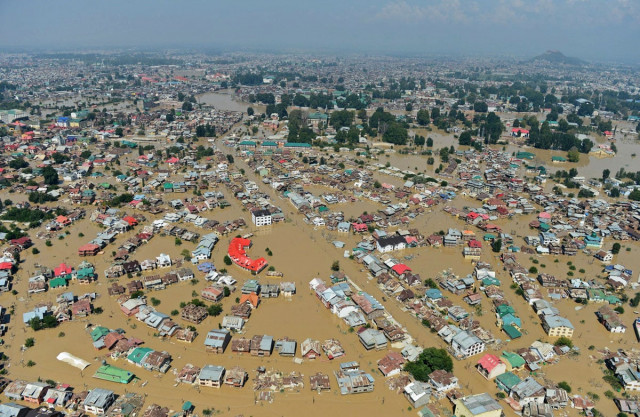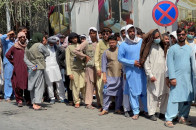Kashmir in tatters
Officials continue to recover the dead even as scale of damage has yet to be assessed

Kashmir in tatters
The posh localities of Raj Bagh, Jawahar Nagar and Gogji Bagh in Civil Lines are still submerged. Official sources say 280 people have died in Jammu and Kashmir – and the dead are still being counted.
Since the water levels have yet to recede completely, the scale of damage to human lives and the economy has yet to be assessed. However, in the last few days at least 18 bodies have been recovered from the submerged areas of Raj Bagh and Jahawar Nagar and authorities fear that there might be more.
When the floods began, the divisional administration soon lost contact with its machinery in the south of Kashmir. When I visited the office of Divisional Commissioner Rohit Kansal in Srinagar on September 6, he expressed his helplessness in contacting his officials, including the DIG, Deputy Commissioner and others in Anantnag. The alarm bells were ringing, but the government hardly noticed.
Soon Srinagar was flooded and the south was forgotten. For days, nothing was certain and we heard stories that many villages had been washed away. The rains did not stop for nearly six days. And even as South Kashmir was under water, the government asked the people not to panic. “This is an unprecedented situation and we are doing the best we can under the circumstances,” Chief Minister Omar Abdullah wrote on Twitter. “Please don’t panic, we will reach you, I promise.” But in a situation like this, panic works as a tool to help save lives. Unfortunately Omar Abdullah did not reach anyone and he surely abandoned every one.
As I write this, 12 days have passed since the waters first came. Kashmir refuses to limp back to normalcy. Healthcare here is in shambles as three major hospitals are under water. There is the threat of water-borne diseases and an epidemic. The carcasses of animals are strewn everywhere. Srinagar’s nerve centre, Lal Chowk, a business hub, has been under water for 13 days now. Roads and bridges have been washed away. Temporary rehabilitation is the great challenge.
Kashmiris have shown exemplary courage is standing against the furious waters and helping each other, but it will take years for Kashmir to rebuild. The government has not declared this a national calamity and has reservations about international aid organisations working here. Soon, we will settle in for the winter. Organised action must be taken now to help those who have lost everything. The River Jhelum has certainly changed its course, but not for something good. It has only brought misery
The writer is a senior journalist based in Srinagar and Editor of the ‘Rising Kashmir’, an English language daily which suspended publication for a short period owing to the floods. It has now resumed publication.



















COMMENTS
Comments are moderated and generally will be posted if they are on-topic and not abusive.
For more information, please see our Comments FAQ